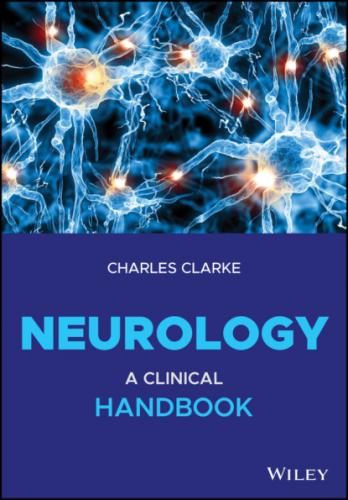8 Chapter 9Figure 9.1 Left temporal abscess MRI: (a) T2‐W. (b) T1‐W post‐contrast.Figure 9.2 Extensive posterior spinal epidural abscess: T2‐W sagittal MRI.Figure 9.3 Neurocysticercosis MR: (a) T2‐W (b) T1‐W post‐contrast – lesions ...
9 Chapter 10Figure 10.1 Nerve trunk, transverse section diagram. (a) Light microscopy. (...Figure 10.2 Pes cavus, clawed toes in CMT1A.Figure 10.3 CMT1A: onion bulb pathology transverse sections: (a) Concentric ...Figure 10.4 Neuromuscular junction. (a) Motor end plate: acetylcholine (ACh)...Figure 10.5 Muscle action diagram. (a) Thin filaments – actin wrapped in neb...
10 Chapter 11Figure 11.1 (a, b) Macroscopic pathology of demyelination. (a) Arrow to circ...Figure 11.2 MR‐T2W. (a) Multiple periventricular MS lesions. (b) Extensive a...Figure 11.3 MR‐T2W typical cervical cord MS lesions.Figure 11.4 MR T2W: extensive cord lesion in NMO.Figure 11.5 MR FLAIR: acute disseminated encephalomyelitis.
11 Chapter 12Figure 12.1 Trigeminovascular system and migraine. Thalamic trigemino‐vascul...
12 Chapter 13Figure 13.1 Cells of the olfactory system.Figure 13.2 Olfactory tract region, from below.Figure 13.3 Cutaneous distribution of V1, V2 and V3.Figure 13.4 Spinal V nucleus: distribution.Figure 13.5 Trigeminal pathways within the brainstem.Figure 13.6 Facial nucleus, facial and abducens (VI) nerves (pons cross‐sect...Figure 13.7 Principal branches of VII.Figure 13.8 Nervus intermedius, greater petrosal nerve and chorda tympani.Figure 13.9 Nerves IX, X, XI and XII: distribution. ICA, internal carotid ar...Figure 13.10 Nerves IX, X and XI: skull base and brainstem.Figure 13.11 Nerve XI, jugular foramen, nucleus ambiguus (AP view, upper cor...Figure 13.12 XII: Nerve peripheral distribution.
13 Chapter 14Figure 14.1 Visual pathway: essential anatomy.Figure 14.2 Typical visual field defects.Figure 14.3 The eight retinal layers.8. Nerve fibre layer7. Ganglion cel...Figure 14.4 Circuit diagram of retina. A, amacrine cell; C, cone; CB, cone b...Figure 14.5 (a) Fovea and optic nerve. (b, c) Fovea and foveola: section and...Figure 14.6 ‘What’ visual pathway – right hemisphere medial surface. (a) Ast...Figure 14.7 ‘Where’ visual pathway – right hemisphere, lateral surface. Aste...Figure 14.8 Cortical eye fields.Figure 14.9 Voluntary conjugate eye movement (midbrain, posterior view).Figure 14.10 Pupillary constriction to light (midbrain, level of superior co...Figure 14.11 Origins of III, IV and VI: transverse sections through brainste...Figure 14.12 III, IV, VI and V within cavernous sinus. (a) Middle cranial fo...Figure 14.13 Dilator and sphincter pupillae, lens and ciliary muscle.Figure 14.14 Central retinal artery occlusion; cherry‐red spot (white arrow)...Figure 14.15 Cholesterol emboli (black arrows).Figure 14.16 Central retinal vein occlusion: scattered deep haemorrhages.Figure 14.17 Giant cell arteritis histology: granulomatous inflammation, fra...Figure 14.18 Right‐sided optic atrophy.Figure 14.19 Chronic bilateral papilloedema and dilated veins with raised in...Figure 14.20 Early papilloedema.
14 Chapter 15Figure 15.1 Vestibular apparatus: (a) Five vestibular sense organs. (b) Cell...Figure 15.2 Semicircular canals and brainstem: head rotation and conjugate l...Figure 15.3 Canalolithiasis. Diagram of a clump of otoconial debris in the p...Figure 15.4 (a) Cochlea (in section). (b) Cochlear nerve, ventral cochlear n...
15 Chapter 16Figure 16.1 Axial T2W MR: right lateral disc protrusion at C3–C4.Figure 16.2 Sagittal T2W MR: central disc protrusion at C5–C6.Figure 16.3 Sagittal T2W MR: central disc protrusion at L5–S1.Figure 16.4 Sagittal T2W MR: multiple lumbar disc protrusions in a narrow ca...Figure 16.5 Sagittal T2W MR: thoracic cord infarction.Figure 16.6 Sagittal T2W MR: spinal AVM – multiple tortuous vessels with sig...Figure 16.7 Sagittal T2W MR: syringomyelia – large fluid‐filled cavity in th...
16 Chapter 17Figure 17.1 Ataxia telangiectasia: typical conjunctival telangiectases.
17 Chapter 19Figure 19.1 Abrupt papilloedema, retinal oedema and venous congestion on Mou...Figure 19.2 Splenium in high‐altitude cerebral oedema.Figure 19.3 Fatal cerebral oedema. (a) Haemorrhagic brainstem infarction. (b...Figure 19.4 Symptomless retinal haemorrhage on Mount Everest.
18 Chapter 20Figure 20.1 CT – acute extradural haematoma.Figure 20.2 CT – large chronic subdural haematoma with an intraventricular d...
19 Chapter 21Figure 21.1 Imaging and macroscopic features of gliomas Grades I–IV.Figure 21.2 Frontal meningioma. MR T1‐enhanced image.Figure 21.3 Primary CNS lymphoma.Figure 21.4 Histological features of Grade I–IV astrocytomas.Figure 21.5 Intramedullary cervical cord glioma. MR T2W.
20 Chapter 24Figure 24.1 Craniosacral parasympathetic and thoracolumbar sympathetic outfl...Figure 24.2 Major neurotransmitters at autonomic ganglia.
21 Chapter 25Figure 25.1 Central neuroanatomy of micturition control.Figure 25.2 Innervation of lower urinary tract. IMP, inferior mesenteric ple...Figure 25.3 Algorithm for incontinence. CISC, clean intermittent self‐cathet...
22 Chapter 26Figure 26.1 Arteries arising from the aorta.Figure 26.2 Arterial supply: spinal cord.
Guide
4 Preface
5 Foreword
8 Index
9 Wiley End User License Agreement
Pages
1 iii
2 iv
3 vii
4 viii
5 ix
6 xi
7 xii
8 1
9 2
10 3
11 4
12 5
13 6
14 7
15 8
